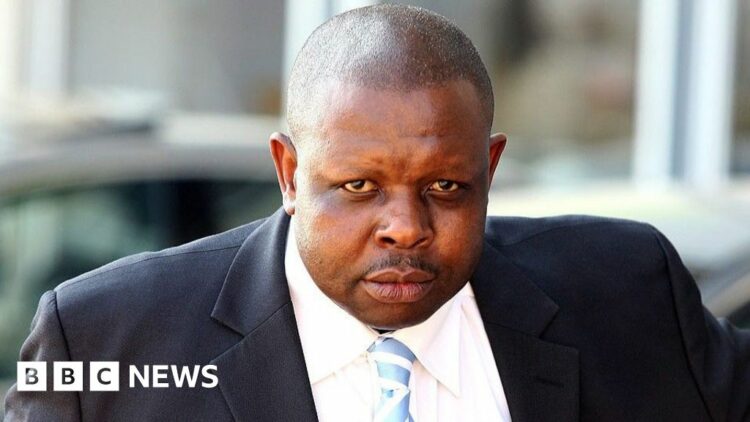Image source, Getty Images
Image caption, As he was sworn in, John Hlophe said the governing ANC party has gone “astray”Article informationAuthor, Wedaeli ChibelushiRole, BBC News
25 June 2024
A former judge in South Africa, who was impeached for misconduct four months ago, has been sworn in as an MP for ex-President Jacob Zuma’s party.
John Hlophe was among the 58 uMkhonto weSizwe (MK) MPs sworn in as the party ended its boycott of the parliament formed after the 29 May elections.
MK, which is set to become the official opposition, has appointed Dr Hlophe to lead its team in parliament.
This is despite Dr Hlophe being impeached as a judge following findings of misconduct.
An investigation found Dr Hlophe, who was the leading judge in the Western Cape province, tried to influence justices at the country’s top court in a case linked to Mr Zuma.
He approached two justices in 2008 to see if they would support Mr Zuma in a decision relating to a corruption case.
He denied any wrongdoing, saying the case was political.
MK emerged as the third-largest party in the election, playing a major role in the African National Congress (ANC) losing its parliamentary majority for the first time in 30 years.
Mr Zuma campaigned for MK after a massive fall-out with the ANC and its leader, President Cyril Ramapahosa.
The ANC has signed a coalition deal with the second-biggest party, the Democratic Alliance (DA), and eight smaller parties to form a new government.
The MK’s 58 new parliamentarians were sworn in more than a week after MPs from other parties were.
MK had been boycotting parliament, claiming the elections were marred by irregularities. It has not provided evidence to support its claim.
On Tuesday MK spokesperson Nhlamulo Ndhlela said that the party’s decision to end the boycott “does not, in any way, signify an acceptance” of the election result.
He has also said MK was “proud” to appoint Dr Hlophe as its parliamentary leader, praising him as an “impeccable jurist and seasoned activist”.
He was chosen for the post after South Africa’s highest court ruled that the constitution barred Mr Zuma from becoming an MP because he was sentenced to 15 months in prison in 2021 for defying a court order to co-operate with a judge-led inquiry into corruption during his nine-year presidency.
As he was sworn in, Dr Hlophe said he was “grateful” to Mr Zuma and the MK leadership for launching the party, adding that the ANC had “completely gone astray”.
“This is not the ANC that we used to know,” he said.
Lawson Naidoo, an expert on South Africa’s constitution, said the “anomaly” that enabled Dr Hlophe to become an MP will have to be addressed at some point.
He told the BBC that the constitution barred an impeached president from holding any public office, but not a judge.
Mr Zuma ditched the ANC for the newly formed MK just five months before the election – and led them to win almost 15% of the vote.
Along with boycotting parliament, MK refused to recognise Mr Ramaphosa as South Africa’s president.
More than a week ago, Mr Ramphosa was voted in by parliament for a second term with the backing of the DA and some smaller parties.
Mr Zuma has described the ANC’s deal with the DA as an “unholy alliance” between black and white elites to benefit the markets, not the people.
MK advocates the nationalisation of white-owned land and mines, a policy also championed by the fourth-biggest party, the Economic Freedom Fighters (EFF).
It, too, has refused to join a coalition government that includes the DA.
For days, the coalition has been negotiating how cabinet posts will be shared.
The DA, which has been the ANC’s long-term rival, has requested it takes up the post of deputy president, and be given control of key ministries, local media reported.
The ANC has dismissed some of its demands as “outrageous”.
Mr Ramaphosa will announce his cabinet once a deal is struck, possibly in the coming days.
“If you have a coalition of 10 parties, it leaves very few parties in parliament to exercise an oversight role,” Mr Naidoo told the BBC.
He added that MK and the EFF would be the main opposition parties, but it was to be seen whether they would play the role of “spoilers” or provide “constructive opposition”.
You may also be interested in:
Image source, Getty Images/BBC
Source link : https://www.bbc.com/news/articles/c844j939l9eo.amp
Author :
Publish date : 2024-06-25 16:11:29
Copyright for syndicated content belongs to the linked Source.
